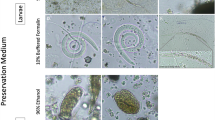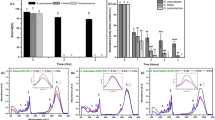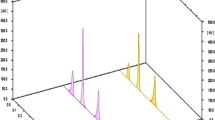Abstract
MANY parasitic nematodes have a tendency to coil considerably when placed in water or cold-fixing fluids such as alcohol or formalin. Ideally, in order to facilitate the subsequent microscopic examination, nematodes should die in an extended position. This is best achieved by the use of 70 per cent alcohol or Looss' fluid (9 parts 70 per cent alcohol and 1 part glycerol), near boiling temperature, in which nematodes uncoil and become fixed rapidly. However, hot alcohol is rarely available during field work, and a simple alternative method for killing and fixing nematodes in an extended position is likely to be desired by other workers.
This is a preview of subscription content, access via your institution
Access options
Subscribe to this journal
Receive 51 print issues and online access
$199.00 per year
only $3.90 per issue
Buy this article
- Purchase on Springer Link
- Instant access to full article PDF
Prices may be subject to local taxes which are calculated during checkout
Similar content being viewed by others
References
Lee, B., The Microtomist's Vade Mecum, edit. by Gatenby, J. B., and Beams, H. W., eleventh ed. (London, 1950).
Romeis, B., Mikroskopische Technik, fifteenth ed. (Munich, 1948).
Author information
Authors and Affiliations
Rights and permissions
About this article
Cite this article
BERLAND, B. Uue of Glacial Acetic Acid for killing Parasitic Nematodes for Collection Purposes. Nature 191, 1320–1321 (1961). https://doi.org/10.1038/1911320a0
Issue Date:
DOI: https://doi.org/10.1038/1911320a0
This article is cited by
-
A quick and simple method, usable in the field, for collecting parasites in suitable condition for both morphological and molecular studies
Parasitology Research (2012)
-
Making the best of things: reclaiming specimens
Systematic Parasitology (1984)
Comments
By submitting a comment you agree to abide by our Terms and Community Guidelines. If you find something abusive or that does not comply with our terms or guidelines please flag it as inappropriate.



